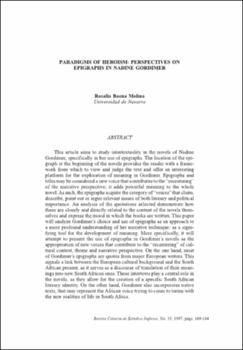Paradigms of Heroism: Perspectives on Epigraphs in Nadinc Gordimer
Author
Baena Molina, RosalíaDate
1997Abstract
This article aims to study intertextuality in the novels of Nadine
Gordimer, specifically in her use of epigraphs. The location of the epigraph
at the beginning of the novels provides the reader with a framework
from which to view and judge the text and offer an interesting
platform for the exploration of meaning in Gordimer. Epigraphs and
titles may be considered a new voice that contributes to the “recentering”
of the narrative perspective; it adds powerful meaning to the whole
novel. As such, the epigraphs acquire the category of “voices” that claim,
describe, point out or argue relevant issues of both literary and political
importance. An analysis of the quotations selected demonstrate how
these are closely and directly related to the content of the novels themselves
and express the mood in which the books are written. This paper
will analyze Gordimer’s choice and use of epigraphs as an approach to
a more profound understanding of her narrative technique: as a signifying
tool for the development of meaning. More specifically, it will
attempt to present the use of epigraphs in Gordimer’s novels as the
appropriation of new voices that contribute to the “recentering” of cultural
context, theme and narrative perspective. On the one hand, most
of Gordimer’s epigraphs are quotes from major European writers. This
signals a link between the European cultural background and the South
African present, as it serves as a discourse of translation of their meanings
into new South African ones. These intertexts play a central role in
the novels, as they allow for the creation of a specific South African
literary identity. On the other hand, Gordimer also incorporates native
texts, that may represent the African voice trying to come to terms with
the new realities of life in South Africa.





